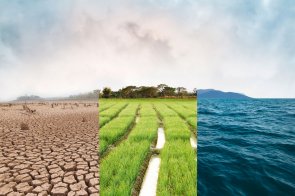
Climate Change and Food Security
The global food system is an incredibly complex system that is shaped by many interrelated factors that are all affected by climate change. Climate change leads to new challenges specifically for the crops upon which the global population has become dependent. According to the USDA, three of the most prominent challenges crops are facing due to climate change are heat stress, pests and diseases
Crops have responded to these challenges in increasingly disastrous ways that often diminish the nutrition they carry, while increasing the toxins they accumulate. This has resulted in food becoming less nutritious.
Drought
Let’s start by taking a look at how drought impacts the quantity and quality of our food. In addition to creating a low water supply, drought conditions can cause dangerous nitrate levels to accumulate in crops - This is due to the fact that stress prevents nitrates from converting into amino acids and proteins necessary for the plant to grow and reproduce. (source: Pulse Headlines)
An example of such devastating drought conditions is happening in Belgium, where they have recently experienced the driest day since the 1800s, resulting in disruptions within the food supply chain. Additionally, in 2019 Chile experienced its driest year in six decades, resulting in an agricultural emergency being declared in 100 regions.
Food Quality
Along with global warming impacting the ability to actually grow crops, it is directly affecting the quality of food that we can produce. According to a report published by the National Center for Biotechnology Information (NCBI), rising concentrations of CO2 are threatening global nutrition by reducing levels of essential nutrients (including zinc, iron, copper, magnesium and calcium) in food crops including rice, wheat and soybeans.
Just as with plants, quality is an issue with fish as well due to rising temperatures. Based on research conducted by the University of Sydney, the nutritional quality of seafood decreases as water temperature increases. It has been made evident that fish and squid have a significantly lower ratio of healthy oils to protein during warm water events (sea surface temperature higher than the 10-year mean). Such nutritional changes may sound small, but these alterations in our food sources have a ripple effect throughout the marine environment, marine predators, and fisheries capturing food for human consumption.
Crop Sensitivity
The IPCC has warned that we may reach a maximum level beyond which the current agricultural practices will no longer be able to support large human populations: “There may be a threshold of global warming beyond which current agricultural practices can no longer support large human civilizations.” (source: IPCC 5th Assessment Report 2014)
It is evident that there is simply not enough information that has been developed and made public regarding the sensitivity of crops (and eventually our supply chain) in relation to increasing global temperatures. The scientific community has been surprised by how sensitive so many essential crops are to the increasing temperatures of our planet. As stated by David Lobell of Stanford University in a New York Times article dating back to 2011: “I think there’s been an under-recognition of just how sensitive crops are to heat, and how fast heat exposure is increasing.”
Human Impact
A report conducted by the UK’s Institute of Mechanical Engineers (IMechE) has discovered that about 1.2-2 billion tons of the food produced in developed countries is either wasted by poor storage, bad distribution and/or too rigorous of quality standards.
The current wasteful behavior accounts for 30-50% of the world’s produced food. Spoiling 2 billion tons of food also means that 35% of the world’s freshwater supply is being wasted. Additionally, modern day agriculture practices use 2.7 trillion cubic meters of water every year, which amounts to about 70% of the world’s freshwater use.
Solutions
Aquaponics and organic gardening address many of these dire issues, providing a solution for how we can secure food and have less waste in the future:
- Aquaponics reduces fuel used for conventional farming.
- Aquaponic and organic farming eliminate the use of pesticides.
- Aquaponics eliminates many soil-borne diseases.
- Aquaponics energy usage is 70% to 92% less than conventional farming
- Aquaponics uses up to 90% less water than conventional farming.
Currently, there is a farmer-led movement to shift to regenerative and organic agriculture. At the same time, we are also witnessing a growing demand from consumers for healthier and “cleaner” food. From farmers and industrialists to average consumers and home growers, we are now seeing a rising determination to implement solutions like organic and sustainable farming. This not only brings new hope to the human population for food security, but it provides an optimistic outlook and promising possibilities for the future and health of our entire planet.
